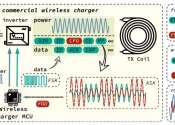A type of cyberattack that could set your smartphone on fire using its wireless charger
A team of security experts at the University of Florida working with security audit company CertiK has found that a certain class of cyberattacks could cause a smartphone to catch fire via its wireless charger. The team has ...









